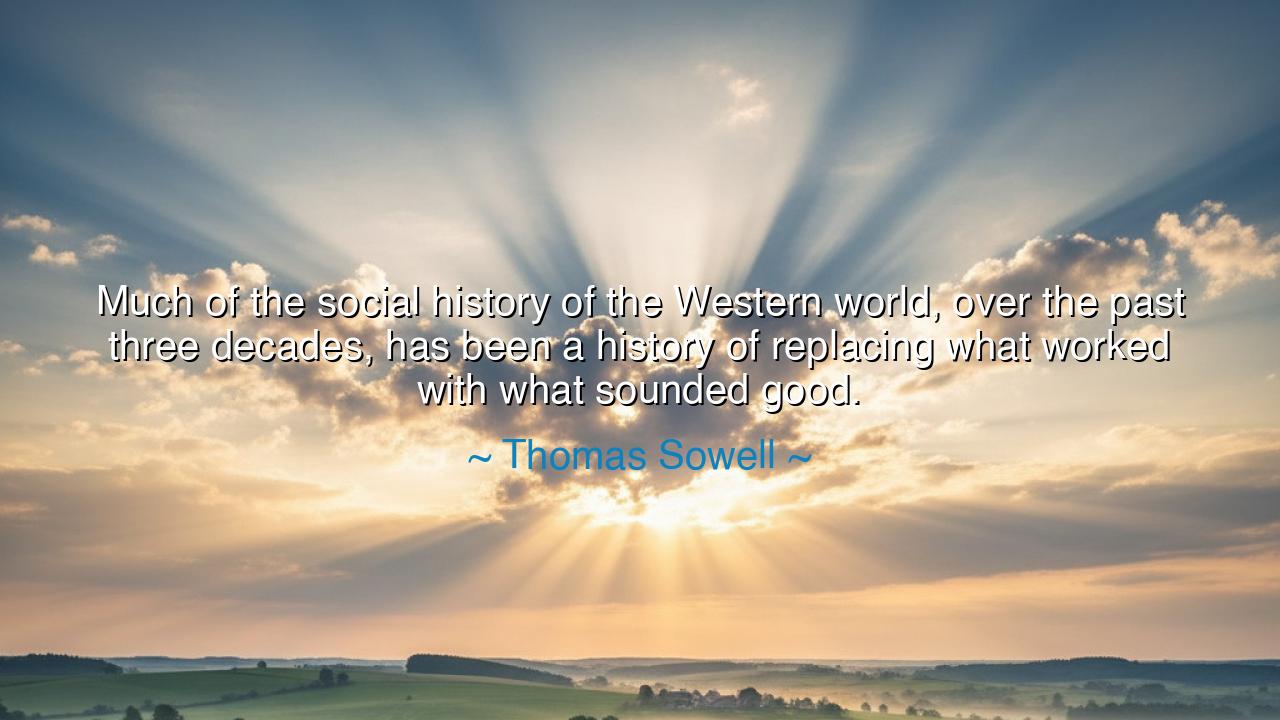
Much of the social history of the Western world, over the past
Much of the social history of the Western world, over the past three decades, has been a history of replacing what worked with what sounded good.






The economist and philosopher Thomas Sowell, a man of piercing intellect and fearless honesty, once wrote: “Much of the social history of the Western world, over the past three decades, has been a history of replacing what worked with what sounded good.” In these few words, he exposes one of the gravest ailments of modern civilization — the triumph of appearance over substance, of emotion over reason, of rhetoric over reality. Sowell, who spent his life studying the rise and fall of ideas, warned that societies do not perish because they forget how to think, but because they forget how to see — to distinguish between what is pleasing to the ear and what is true in practice.
The origin of this quote lies in Sowell’s long reflection upon the failures of social policy in the twentieth century. Writing in the late 20th and early 21st centuries, Sowell observed how governments and institutions, eager to appear compassionate or progressive, often enacted measures that were morally fashionable but practically destructive. His words came not from bitterness, but from sorrow — the sorrow of a man who had seen noble intentions produce ruin, and who understood that the price of abandoning truth for sentiment is always paid by the innocent. To Sowell, history is not merely a chronicle of progress, but a record of folly, in which each age must decide whether to live by wisdom or by illusion.
To say that the Western world has replaced “what worked” with “what sounded good” is to recognize that humanity often prefers the comfort of words to the discipline of results. In an age of slogans and promises, men are seduced by the melody of rhetoric — they mistake good intentions for good outcomes, policy for progress, virtue-signaling for virtue itself. But reality, that stern and unyielding teacher, always waits. You may ignore her laws, but you cannot escape their consequences. Sowell, as an economist and social thinker, saw this pattern in everything from education to welfare, from criminal justice to economics — noble ideas that promised deliverance but produced dependency, disorder, and decay.
Consider, for example, the Great Society programs of the 1960s in the United States. They were born of compassion — to end poverty, to uplift the marginalized, to heal the wounds of inequality. Yet in seeking to build a paradise of words, policymakers neglected the practical wisdom of families, communities, and tradition. In the name of progress, systems were created that rewarded idleness, undermined responsibility, and eroded the very institutions that had long sustained the poor — family, work, and faith. What sounded good — “ending poverty through government care” — replaced what worked: empowering individuals through discipline, education, and self-reliance. Decades later, the result was not liberation, but despair. And thus, history bore witness to Sowell’s lament: that what is pleasing to declare is often deadly to live.
This truth extends far beyond politics. It is visible wherever ideology triumphs over experience — in education that values self-esteem over learning, in culture that prizes expression over excellence, in public discourse that exalts outrage over understanding. The ancients, too, warned of this peril. The philosopher Plato wrote that when men prize the appearance of virtue over its reality, the state falls into ruin. Sowell’s words are the modern echo of that ancient wisdom: when people abandon what works — the tested, the proven, the disciplined — for what merely sounds noble, they trade truth for illusion and strength for fragility.
Yet within this warning lies a call to courage. For it is not enough to mourn the loss of wisdom; one must live it again. To follow Sowell’s teaching is to reclaim the forgotten art of discernment — to measure ideas not by how they sound, but by what they produce. It is to ask, before every policy, every belief, every change: Does it work? Does it make life better, freer, and more just — or does it only make us feel righteous? For in the realm of civilization, good feelings cannot substitute for good foundations. Compassion must be guided by reason, and reform must be tempered by humility.
And so, the lesson that emerges from Sowell’s wisdom is one both ancient and eternal: do not be deceived by fine words or glittering promises. Judge every idea by its fruit, and every policy by its results. Remember that the world is not improved by those who talk of justice, but by those who build it; not by those who praise virtue, but by those who practice it. Wisdom is not the enemy of compassion — it is its guardian. The heart must be guided by the mind, or both will perish in folly.
My children of this restless age, remember this well: history has no mercy for those who replace truth with comfort. The ruins of empires are filled with the echoes of good intentions unmoored from wisdom. Let your generation be different. Seek truth before applause, results before rhetoric, and reality before reverence. For when the world again begins to prize what works over what sounds good, it will not merely remember Sowell’s warning — it will fulfill it, and in doing so, reclaim the strength and sanity of civilization itself.






AAdministratorAdministrator
Welcome, honored guests. Please leave a comment, we will respond soon